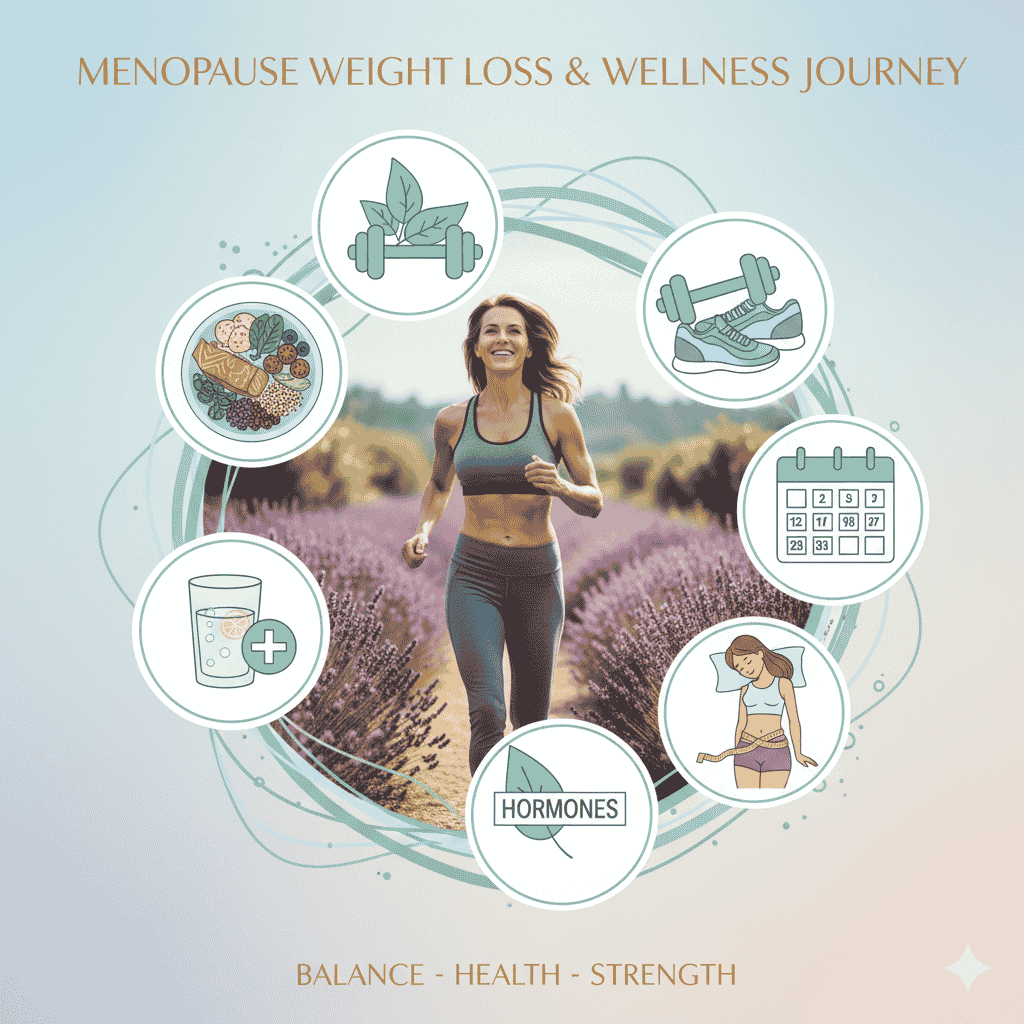Discover a simple 6-week menopause weight loss plan with meals, strength tips, sleep fixes and stress relief to beat stubborn belly fat naturally.
Menopause doesn’t just change your cycle — it can change your body, your sleep, your mood and how your clothes fit. If you’re seeing extra weight around your midsection and feeling frustrated, you’re not alone. Hormone shifts, lower muscle mass and slower metabolism make belly fat more common in midlife, but you can still regain control. This guide gives simple, practical steps you can start today — no fads, just evidence-informed advice and everyday strategies
Why Menopause Weight Loss Feels Harder — And How to Overcome It
As estrogen falls, your body can shift toward storing more fat centrally (around the belly) while losing some muscle mass. That combination reduces resting metabolic rate and makes weight harder to lose. Lifestyle factors (sleep, stress, activity) and aging also play a role. These are common, normal changes — but they’re also changeable with the right plan.
A Gentle, Realistic 6-Week Menopause Weight Loss Plan
This is not a crash diet. It’s a set of sustainable changes that stack up over time.
Week 1–2: Baseline & small swaps
- Track 1 week. Note meals, steps, sleep and stress triggers. Awareness is the first tool.
- Swap, don’t punish. Replace sugary drinks with water or herbal teas. Reduce late-night snacking. Small cuts add up.
- Move daily. Aim for a 30-minute walk or equivalent every day to reset energy and mood.
Week 3–4: Add strength + protein
Strength Training — The Key to Menopause Weight Loss Success: Two short sessions (25–30 min) focusing on big moves — squats, push-ups (inclined if needed), rowing, deadlifts with light weights or bands. Strength preserves muscle and boosts metabolism.
Protein at each meal. Include eggs, fish, pulses, Greek yogurt or tofu — protein helps preserve lean mass and fills you up.
Week 5–6: Improve sleep & manage stress
Sleep wins. Keep your bedroom cool, limit screens before bed, and aim for consistent bedtimes. Poor sleep increases cravings and weight gain risk.
Stress toolkit. Practice 5–10 minutes/day of breathing, short walks, or a quick mindfulness habit. Chronic stress spikes cortisol which encourages belly fat.
Refine portions. Use plate portions (half veg, quarter protein, quarter carbs) rather than strict calorie counting.
Practical relief for common menopause symptoms that interfere with weight loss
- Hot flashes / night sweats: Dress in layers at night, use a fan, avoid trigger foods (spicy food, alcohol, caffeine). Cognitive behavioural therapy (CBT) and paced breathing can reduce frequency for some women. For persistent severe hot flashes, medical options exist — discuss with your clinician. nhs.uk+1
- Low energy / brain fog: Prioritise short bursts of activity and protein-rich breakfasts. Gentle morning movement helps mental clarity.
- Vaginal dryness / painful sex: Pelvic moisturizers and over-the-counter vaginal lubricants can help; talk with your healthcare provider for prescription options if needed. (Medical sources linked below.)
Foods That Support Menopause Weight Loss Naturally
- Whole, minimally processed foods — vegetables, fruits, legumes, whole grains, fish and lean proteins.
- Strength + protein to preserve muscle. Aim for at least 2 resistance sessions weekly.
- Limit alcohol & refined sugar — both can worsen sleep and increase belly fat.
- Stay consistent — small, daily habits beat dramatic weekend-only efforts.
Evidence-based health organizations emphasise these core approaches and also note HRT (hormone therapy) as an effective option for symptom control when appropriate — discuss benefits/risks with your clinician.
When to see a doctor
- If symptoms (hot flashes, sleep loss, mood swings) are severe and affecting quality of life.
- If weight gain is sudden and unexplained, or accompanied by other concerning signs.
- A clinician can check thyroid, metabolic health, and discuss safe options including HRT or non-hormonal medicines if needed. Recent medical advances are expanding options for non-hormonal relief — speak with a specialist for up-to-date choices.
Quick FAQs
- Q: Is weight gain inevitable?
- A: No — many women gain some fat around midlife, but with strength training, protein, sleep and stress work, you can reduce belly fat and feel stronger.
- Q: Should I try a “menopause diet”?
- A: Be careful of one-size-fits-all diets. Focus on sustainable patterns: whole foods, strength training and sleep. Short-term extreme diets can backfire.
- Q: Is HRT required to lose weight?
Short checklist to start today
- Drink one extra glass of water per day.
- Swap one sugary snack for fruit or nuts.
- Do a 20–30 minute walk.
- Add one protein-rich item to each meal.
- Schedule two 25–30 minute strength sessions this week.
External resources & reputable reading
- NHS — Menopause: treatments & practical tips. nhs.uk+1
- Mayo Clinic — Menopause symptoms & care. Mayo Clinic
- The North American Menopause Society / Menopause.org — patient resources and non-hormonal options (see their menonotes and patient guides). Mayo Clinic
- Recent news on new non-hormonal therapies (elinzanetant / Lynkuet): Reuters report. Reuters
Menopause is a stage, not a sentence. The body changes you’re seeing are common — and with gentle, consistent steps you can reduce belly fat, sleep better and feel more like yourself again. Start small, be kind to yourself, and consider medical advice when symptoms interfere with daily life.
